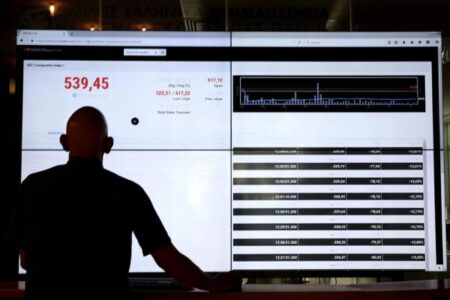- Tesla’s $10 billion Mexico gigafactory is in doubt after Donald Trump regained the presidency.
- Elon Musk paused the project before the election and warned that higher tariffs could affect it.
- Analysts said tariffs on cars imported from Mexico would have dire consequences for US automakers.
President-elect Donald Trump has said he wants to crack down on automakers building cars in Mexico — and that could be a problem for Tesla.
Trump has floated imposing tariffs higher than 200% on vehicles imported from Mexico, a move analysts told Business Insider could throw the US auto industry into crisis.
It’s also put a $10 billion new factory proposed by one of his biggest backers in limbo.
Tesla announced in March 2023 that it was planning to build its seventh gigafactory near the industrial hub of Monterrey, Mexico.
The project has since been hit by delays and uncertainty, with Elon Musk telling investors earlier this year that it was on pause until the election outcome was clear.
“Trump has said that he will put heavy tariffs on vehicles produced in Mexico, so it doesn’t make sense to invest a lot in Mexico if that is going to be the case,” the Tesla CEO said in July. Musk bet big on the former president’s election campaign and could be given a role in his administration.
Trump’s victory has pushed Tesla’s project even further into purgatory. Mexico’s economy minister told local media last week he planned to set up a meeting with Musk to clarify the factory’s status.
Trump vowed to clamp down on automakers building cars in Mexico on the campaign trail, and the prospect of new tariffs could force US automakers such as Tesla to make some hard choices about operational or planned factories in Mexico.
Investment bank UBS warned that any tariffs on Mexico would be “highly disruptive” to the entire US automotive industry, in an analyst note released after the election. Analysts told BI that the tariffs floated by Trump would deter automakers such as Tesla from investing in Mexico.
“Everything’s up in the air with Tesla’s plant,” said Sam Fiorani of AutoForecast Solutions. “Depending on the level of the tariffs, it could complicate the investment in Mexico.”
A looming crisis
Fiorani told BI that factories in Mexico were crucial for US manufacturers — particularly the Detroit “Big Three” of Ford, General Motors, and Stellantis — because it offered cheap parts and labor.
General Motors and Stellantis have around a third of their full-size pickup truck production in Mexico, according to Morningstar analyst David Whiston, while Ford builds its Maverick compact pickup there.
Mexico is also a crucial production hub for Ford’s Mustang Mach-E EV, built at the company’s Cuautitlan plant.
The country’s free trade agreement with the United States, which allows automakers to import vehicles across the border without duties and is up for review in 2026, has attracted other automakers outside the Big Three.
Toyota, the world’s largest carmaker, announced in 2020 it would move production of its Tacoma pick-up from the US to Mexico, while Nissan and Volkswagen also have factories in the country.
Mexico has also attracted interest from Chinese automakers, sparking fears from some lawmakers that they could use the country as a “backdoor” to the US market.
Chinese EV giants BYD and MG have both announced plans to build factories in the country. BYD has denied reports that it put those plans on hold to wait out the election outcome.
Other automakers have expanded their presence in Mexico, despite the uncertainty of the election and the prospect of tariffs under a second Trump term.
Stellantis brand Jeep is building its first electric vehicle, the Wagoneer S, at its Toluca plant in Mexico, according to a breakdown of the company’s 2024 manufacturing operations.
The CEO of Chrysler, another Stellantis brand, also recently confirmed it was expanding a factory in Mexico as a “relief valve” for US truck production, after The Wall Street Journal reported the company was considering making its bestselling Ram 1500 truck south of the border.
German luxury brand BMW, meanwhile, is investing 800 million euros ($861 million) in expanding its factory at San Luis Potosí, Mexico, which is expected to produce the company’s next-generation Neue Klasse lineup from 2027.
“Imposing tariffs would be a deterrent. It would make it difficult if you’re planning on exporting to the US,” Stephanie Brinley, an automotive analyst at S&P Global, told BI.
She added: “It makes building a plant in Mexico more expensive and less attractive.
Costly dilemma
Brinley added that many automakers with a significant US presence had been established in Mexico for decades, meaning it would cost billions and be highly difficult to shift production to the US or other markets in response to tariffs.
“That would be a massive investment issue … it would probably require a staggering amount of money and would not be something they could do quickly. Changing that manufacturing footprint would take at least five years,” she said.
Ultimately, Brinley said many US automakers may decide it’s in their best interests to stay put, despite the tariffs — something that she said could lead to higher prices for consumers north of the border.
“That’s where the tariff ends up hurting the consumer, because these companies are not going to just eat the tariff. Some, if not all of the cost would be passed on to consumers,” Brinley said.
Tesla, GM, Ford, and Stellantis did not respond to requests for comment from BI.
Read the full article here
















